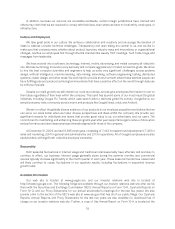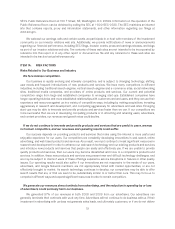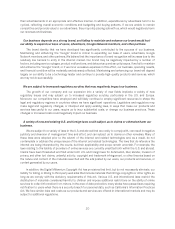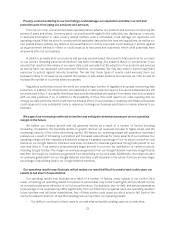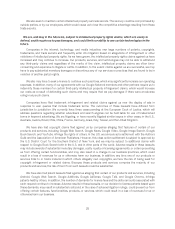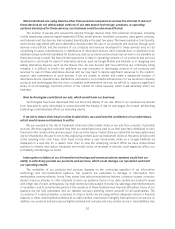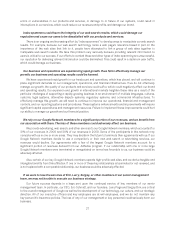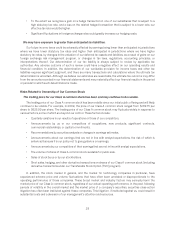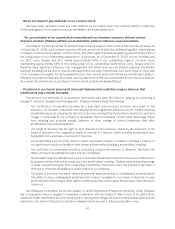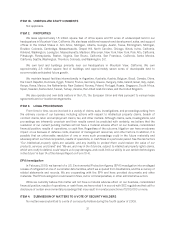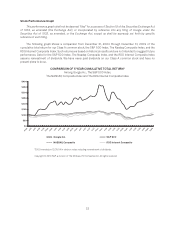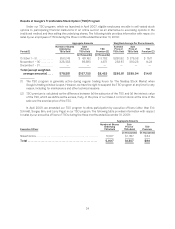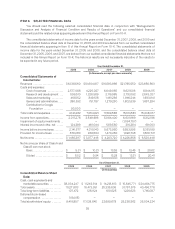Google 2009 Annual Report Download - page 46
Download and view the complete annual report
Please find page 46 of the 2009 Google annual report below. You can navigate through the pages in the report by either clicking on the pages listed below, or by using the keyword search tool below to find specific information within the annual report.We rely on highly skilled personnel and, if we are unable to retain or motivate key personnel, hire
qualified personnel, or maintain our corporate culture, we may not be able to grow effectively.
Our performance largely depends on the talents and efforts of highly skilled individuals. Our future success
depends on our continuing ability to identify, hire, develop, motivate, and retain highly skilled personnel for all areas
of our organization. Competition in our industry for qualified employees is intense, and certain of our competitors
have directly targeted our employees. In addition, our compensation arrangements, such as our equity award
programs, may not always be successful in attracting new employees and retaining and motivating our existing
employees. Our continued ability to compete effectively depends on our ability to attract new employees and to
retain and motivate our existing employees.
In addition, we believe that our corporate culture fosters innovation, creativity, and teamwork. As our
organization grows, and we are required to implement more complex organizational management structures, we
may find it increasingly difficult to maintain the beneficial aspects of our corporate culture. This could negatively
impact our future success.
Our business depends on continued and unimpeded access to the internet by us and our users.
Internet access providers may be able to block, degrade, or charge for access to certain of our products
and services, which could lead to additional expenses and the loss of users and advertisers.
Our products and services depend on the ability of our users to access the internet, and certain of our products
require significant bandwidth to work effectively. Currently, this access is provided by companies that have significant
and increasing market power in the broadband and internet access marketplace, including incumbent telephone
companies, cable companies, and mobile communications companies. Some of these providers have stated that they
may take measures that could degrade, disrupt, or increase the cost of user access to certain of our products by
restricting or prohibiting the use of their infrastructure to support or facilitate our offerings, or by charging increased
fees to us or our users to provide our offerings. While interference with access to our popular products and services
seems unlikely, such carrier interference could result in a loss of existing users and advertisers and increased costs,
and could impair our ability to attract new users and advertisers, thereby harming our revenues and growth.
To the extent our revenues are paid in foreign currencies, and currency exchange rates become
unfavorable, we may lose some of the economic value of the revenues in U.S. dollar terms.
As we expand our international operations, more of our customers may pay us in foreign currencies. Since we
conduct business in currencies other than U.S. dollars but report our financial results in U.S. dollars, we face exposure
to fluctuations in currency exchange rates. For instance, if currency exchange rates were to change unfavorably, the
U.S. dollar equivalent of our operating income recorded in foreign currencies would be diminished. Hedging strategies,
such as forward contracts, options, and foreign exchange swaps that we have implemented or may implement to
mitigate this risk may not reduce or completely offset our exposure to foreign exchange fluctuations. Additionally,
hedging programs expose us to risks that could adversely affect our financial results, including the following:
• We have limited experience in implementing or operating hedging programs. Hedging programs are
inherently risky and we could lose money as a result of poor trades.
• We may be unable to hedge currency risk for some transactions or match the accounting for the hedge
with the exposure because of a high level of uncertainty or the inability to reasonably estimate our foreign
exchange exposures.
• We may be unable to acquire foreign exchange hedging instruments in some of the geographic areas
where we do business, or, where these derivatives are available, we may not be able to acquire enough of
them to fully offset our exposure.
• We may determine that the cost of acquiring a foreign exchange hedging instrument outweighs the
benefit we expect to derive from the derivative, in which case we would not purchase the derivative and
would be exposed to unfavorable changes in currency exchange rates.
28


